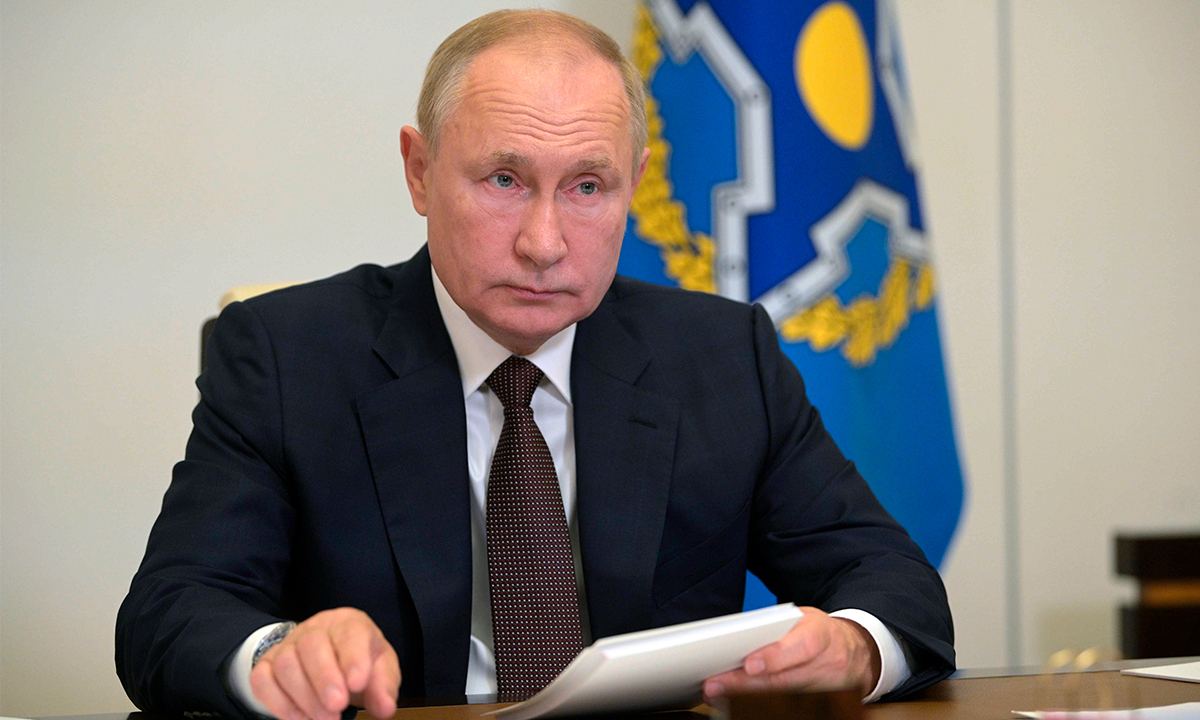
Russian President Vladimir Putin attends a meeting of the Collective Security Treaty Organization by video conference at the Novo-Ogaryovo residence outside Moscow, Russia on Thursday. Putin was in self-isolation after people in his inner circle confirmed infections of COVID-19. Photo: VCG
Earlier in the day, Putin arrived in Sochi to hold a series of meetings on the future of the Russian army and military-industrial sector.
Washington's plans to deploy intermediate-range missiles in Europe pose a threat to Russia, Russian President Vladimir Putin said on Monday.
"Everyone is aware of the US' plans to deploy intermediate-range missiles in Europe, this poses a great danger and threat to us," Putin told Defence Ministry representatives.
He added that Russia will "adequately respond" to foreign countries' attempts to break strategic parity.
"We are all well aware that some of our foreign partners do not cease attempts to break the parity, including through deploying elements of the global missile defence in direct vicinity to our borders. We cannot fail to notice these threats to Russia's security and will react in an adequate manner," Putin said.
According to Putin, Russia's upgraded air defence systems will be able to detect and destroy hypersonic and ballistic missiles of all types.
Under the state armament programme, 25 S-400 anti-aircraft missile systems and over 70 modern fighters were delivered over the past four years. More than 20 S-300 systems and 90 aircraft were upgraded," Putin said during the meeting with Defence Ministry officials.
He added that the Russian military will soon receive a first batch-produced S-500 missile system.
"In the coming years, more than 200 aircraft and 26 S350 and S400 anti-aircraft missile systems, as well as the first production model and the newest S500 missile system, are to be supplied to troops," Putin said.
During the meeting, he also spoke about key priorities in relation to upgrading Russia's Navy.
"Another extremely important task is to equip the Russian navy with modern equipment and weapons. Over the past 4 years, the Navy has included 49 new ships and combat boats, 9 coastal missile systems, and 10 aircraft," Putin said.
Earlier this month, Putin said that the arms race between Russia and the US was intensifying, following Washington's withdrawal from the 1972 Anti-Ballistic Missile Treaty.
In August 2019, Washington withdrew from the Intermediate-Range Nuclear Forces (INF) Treaty, signed by the Soviet Union and the United States in 1987. It applied to deployed and non-deployed ground-based missiles of intermediate-range (1,000-5,000 kilometres) and shorter-range (500-1,000 kilometres). Commenting on its move, the US said that Russia had refused to comply with Washington's demand that the new 9M729 cruise missiles be eliminated because they allegedly violated the INF Treaty. Moscow strongly rejected the accusations, saying that the technical parameters of the 9M729 missiles met the parameters allowed by the treaty.
The following month, President Putin sent a letter to the leaders of several countries, including NATO members, suggesting to introduce a moratorium on deploying intermediate-and shorter-range missiles in Europe and other regions. The US turned down the initiative.
Russia's Relations With NATOThis comes against the backdrop of Russia's souring relations with NATO, which according to the bloc's Secretary-General Jens Stoltenberg, are at their lowest point since the Cold War.
He made this statement ahead of the defence ministers' summit in Brussels on 21 October. It took place following the expulsion of eight diplomats from Russia's mission amid accusations that they were intelligence agents. In response, Moscow suspended its mission to NATO and closed NATO's office in Moscow. Russian Deputy Foreign Minister Alexander Grushko accused the bloc of "sliding into Cold War schemes" and suggested that normal diplomatic relations with the alliance were impossible amid the hostile measures it has taken against Moscow.
Russian Foreign Minister Sergei Lavrov recently said the relations between Russia and NATO could not be called catastrophic because they simply do not exist at the moment. According to him, facts prove that NATO does not want any cooperation with Russia.




